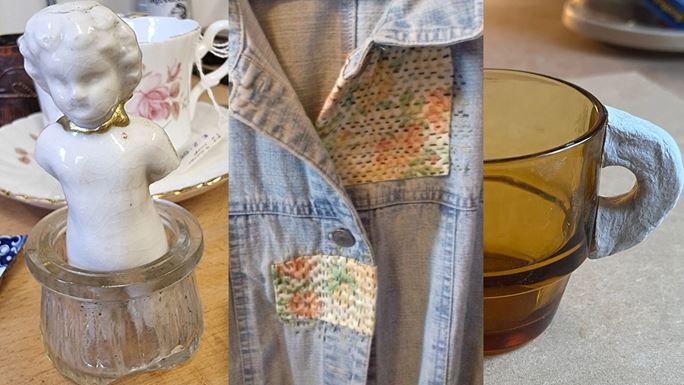The Repair Centre: A Playful Space for Creative Mending
News

Jenny Walker, our creative producer for The Repair Centre, shares more about the ethos behind the project. Jenny has now worked with Portraits of Recovery on a number of projects. As a lead artist for TYPECAST: Manchester (2014) an international project which explored the relationship between clay and recovery processes, then as creative producer for our recently delivered Sounds at the Edges.
Kintsugi or gold joining is an ancient form of Japanese ceramic repair. It chooses to make visible and precious the signs of mending, never hiding the story of an object’s journey and transformation. This act of repair made with painstaking time and care, documents and celebrates an object’s history, whilst making it stronger and arguably more beautiful. This ethos is what inspired our project about people and repair…
Kintsugi philosophy evidences that something new, useful, and more interesting can come out of damage, loss and change. This notion may be paralleled in the stories of people in recovery, but society does not always value those who have experienced these reconstructive, mending processes.
The Repair Centre is interested in the relationship between repair and recovery and what the interconnected methodologies and approaches can learn from the other. Can people previously viewed as broken and unfit for purpose, be seen as renewed, transformed and consequently valuable assets to our society? We wish to challenge prevalent perceptions of the recovery community by metaphorically and physically exploring these concepts through object making and repair.
From our temporary project home at Manchester Craft and Design Centre, we’ve been hosting a series of non-traditional Kintsugi-inspired workshops, providing opportunities for participants to explore personal narratives and metaphors around recovery through ceramic reconstruction.
In the next phase of The Repair Centre, we will diversify into other materials and approaches to design and making, including Japanese textile mending techniques; workshops which reconsider value in domestic items by celebrating the marks of use; and the inventive application of paper pulp to restore and complete objects with missing parts. The artists commissioned and delivering these workshops (James Ackerley, Jayne Gosnall, Maisie Pritchard) will each explore imaginative and surprising repair techniques accessible to all, even on a budget! Our contributing artists are all materially-led, with environmental considerations central to their socially-engaged practices.
The final stages of The Repair Centre will enable participants to gain insights into creative, cultural and educational environments through professionally-led, contextualising visits to Boiler House and MMU’s Special Collections Museum. Coupled with public facing applications, an invited audience will have the chance to experience what has been learned ovet the 14 week project, through activities led by the participants themselves!
We hope that this project will open doors to new creative worlds, and provide an outlet for artistic expression that supports recovery in both practical and aspirational terms.
Find out more about The Repair Centre here, or sign up for our newsletter to hear about how you can interact with the project at a forthcoming event.
 Menu
Menu